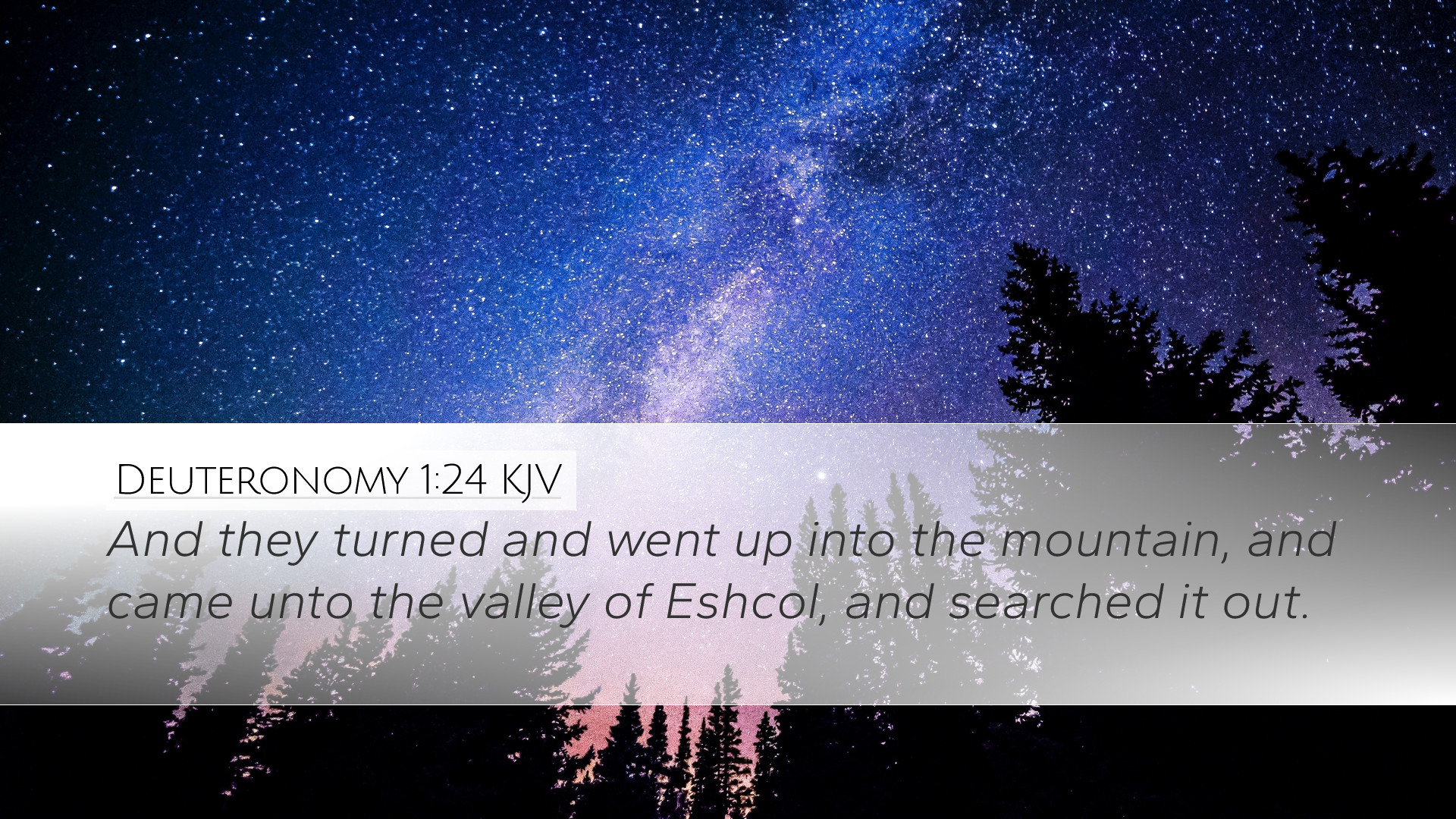Commentary on Deuteronomy 1:24
Deuteronomy 1:24 states: "And they turned and went up into the mountain, and came unto the valley of Eshcol, and searched it out." This verse describes a crucial moment in the history of Israel, marking the transition from Egypt toward the Promised Land.
This commentary will explore the context, significance, and theological implications of this moment by drawing from the insights of public domain commentators such as Matthew Henry, Albert Barnes, and Adam Clarke.
Contextual Background
The book of Deuteronomy serves as Moses' farewell address to the Israelites as they stand on the brink of entering Canaan. They are reminded of their journey, the covenant they share with God, and the consequences of their past actions. Moses recounts their wilderness experiences, emphasizing faithfulness to God's commands.
Historical Significance
Matthew Henry highlights the importance of this moment as the Israelites prepare to take possession of a land that has been promised to them. He notes that the journey to Eshcol represents a pivotal point in their history, where they are called to exercise faith and courage.
Albert Barnes reinforces this by indicating that the valley of Eshcol was chosen as a point of exploration due to its potential fruitfulness. The spies' mission reflects the Israelites' need to understand the challenges they would face in Canaan, emphasizing the role of careful planning interwoven with divine guidance.
The Role of the Spies
The act of sending spies is critical in understanding the dynamics of faith and fear present in Israel. Adam Clarke notes that this action was born out of the people's desire for assurance rather than absolute dependence on God’s promise. Clarke indicates that this reflects a moment of weakness in faith, which would have lasting consequences.
Matthew Henry also remarks that while the exploration was prudent, it was essential that the people recognize the limitations of their own understanding in light of God's power. Their reconnaissance mission became a moment where faith was tested, setting the stage for either victory or defeat.
Theological Implications
The sending of the spies serves as a metaphor for the church's journey of faith today. Albert Barnes posits that this moment demonstrates how God's people should seek His guidance while actively engaging in life’s tasks. While the act of exploration is important, it needs to be done in conjunction with trust in God's provision.
Furthermore, Henry discusses the implication of divine promises juxtaposed with human action. He argues that while seeking knowledge and preparation is wise, it should never overshadow the necessity of faith in God’s promises.
Adam Clarke elaborates on the need for a balanced approach to faith and action, calling out the danger of reliance solely on human wisdom when facing trials. The balance, according to Clarke, is in recognizing God’s sovereignty even as one undertakes arduous tasks.
Lessons for Believers
This passage imparts various lessons for contemporary readers. Here are some key insights:
- Faith over Fear: The act of sending spies metaphorically represents the fear that often accompanies new endeavors. Believers are encouraged to place their trust in God's promises.
- Preparation and Prayer: The emphasis on surveying the land highlights the importance of preparation in doing God’s work, all while prioritizing prayer and reliance on divine guidance.
- God’s Sovereignty: Even in struggles and trials, believers are reminded of the overarching control God has over every situation.
- The Importance of Community: The spies worked as a collective unit, underlining the significance of unity among believers in pursuing God’s mission.
Conclusion
Deuteronomy 1:24 is a verse rich in historical context and theological implications. The exploration of the valley of Eshcol encapsulates the essence of Israel's journey—a transition from the wilderness of doubt into the assurance of the Promised Land through faith and obedience.
In the commentary provided by Matthew Henry, Albert Barnes, and Adam Clarke, we discover foundational lessons for our lives as believers today. The historical narrative not only provides insight into the past but also lays the groundwork for understanding faith, preparation, and God’s faithfulness in our present and future.


